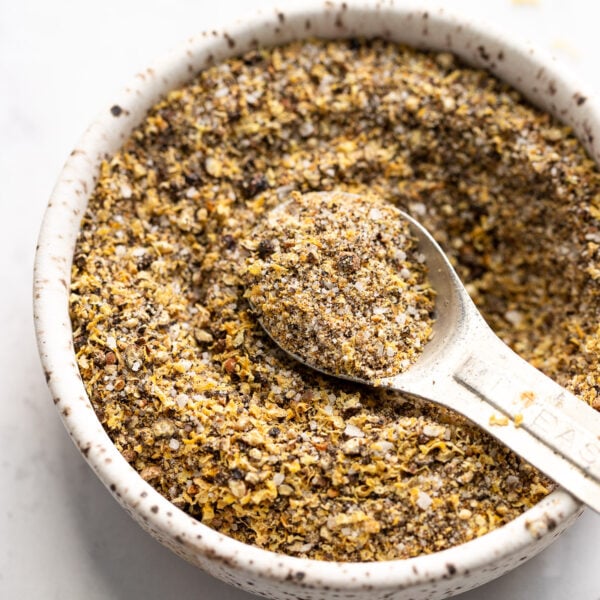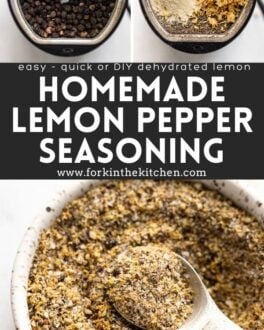PSA: lemon pepper seasoning is not just for chicken wings. And it’s not just for grilled meats, either. No, my friend, this homemade seasoning blend is so versatile and one you’re going to want to have in your kitchen at all times.
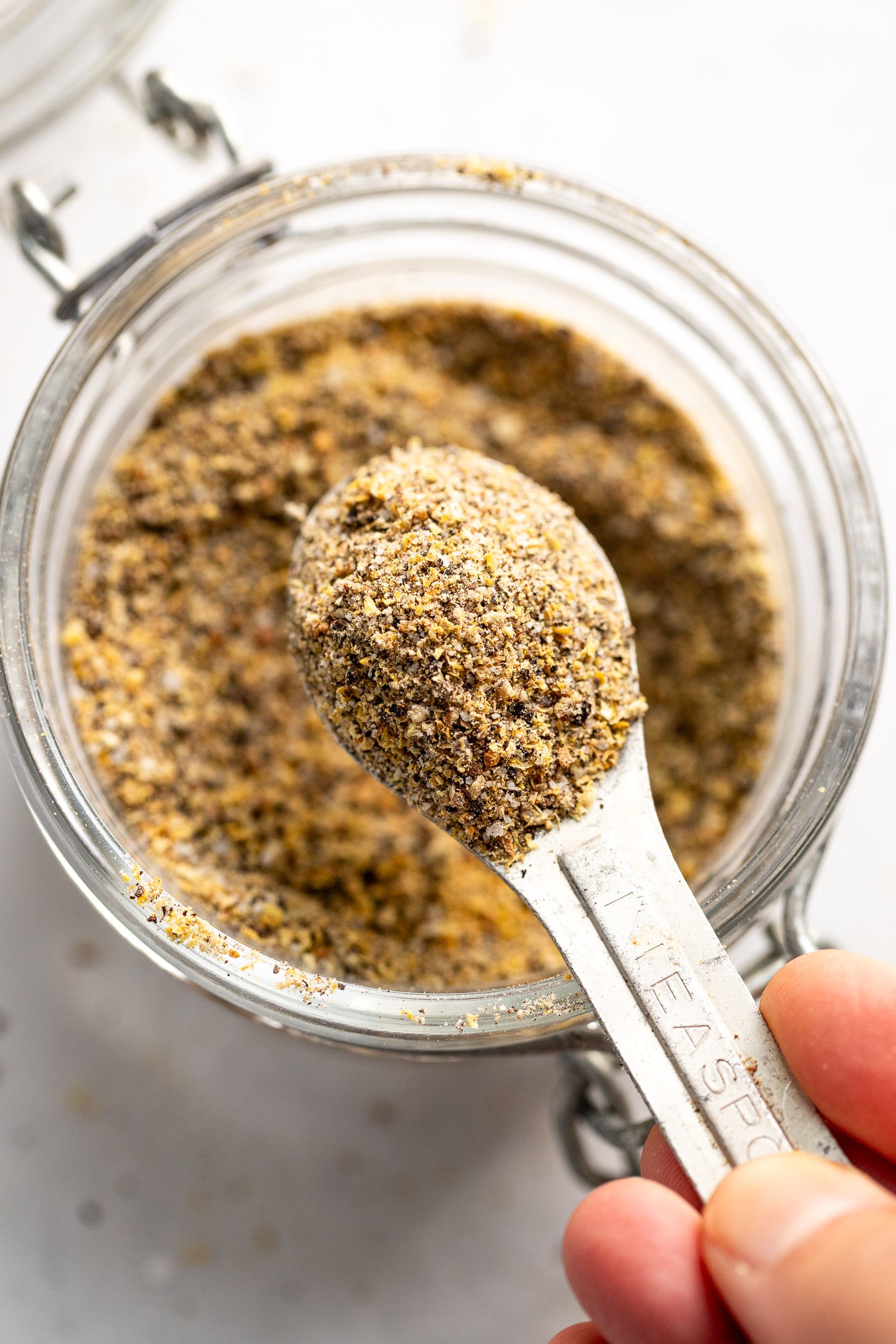
It adds a bright, zesty, peppery kick to a variety of foods. Sprinkle it over roasted vegetables, add it to your favorite homemade salad dressings for a little pizazz, and even use it as a seasoning for homemade popcorn!
It doesn’t stop there, either. We’ll cover more ways to use this spice blend, but first, let’s talk about the two ways to make it!
Ingredient Spotlight
Lemon pepper seasoning is essentially a blend of lemon and black pepper. It’s bright and has an earthy, spicy kick from the freshly ground black pepper.
That is key, you’ll want to be sure to use whole black peppercorns when making the seasoning for the most flavor. For added flavor, we’re also using garlic powder and onion powder.
Adding kosher salt helps to preserve the lemon when using fresh, too. It also rounds out the flavors and seasons food evenly.
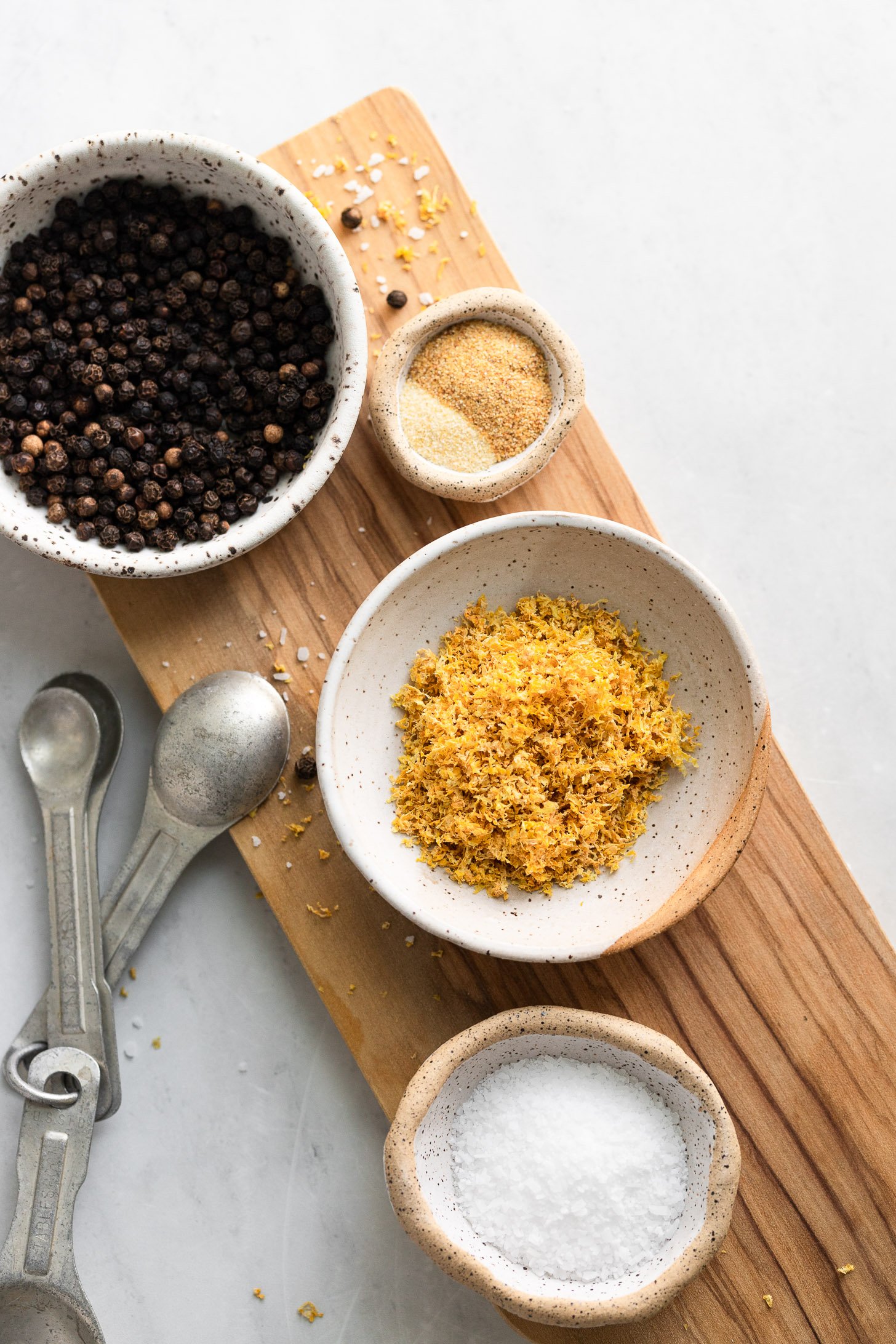
Lemon Zest
And last but not least (and maybe actually the star?) is lemon zest. I’m going to go in-depth with two ways to make this seasoning blend using either store-bought dried lemon peel, or a homemade version, drying your own lemon zest.
Using a store-bought variety of dried lemon peel means it’s much quicker to throw together a batch of lemon pepper seasoning, but in some cases, it’s not quite as fresh. I do find, however, that the flavor can be more intense than dehydrating lemon on your own.
The flavor, of course, will depend on the brand or the type of lemons you use in each method. If you have the ability to choose the type of lemon you purchase, Bearss lemons are ideal, because they tend to have more oils in their skin, which means the zest is more flavorful. Overall, look for larger, thick-skinned lemons for easy zesting. Unwaxed lemons are preferred.
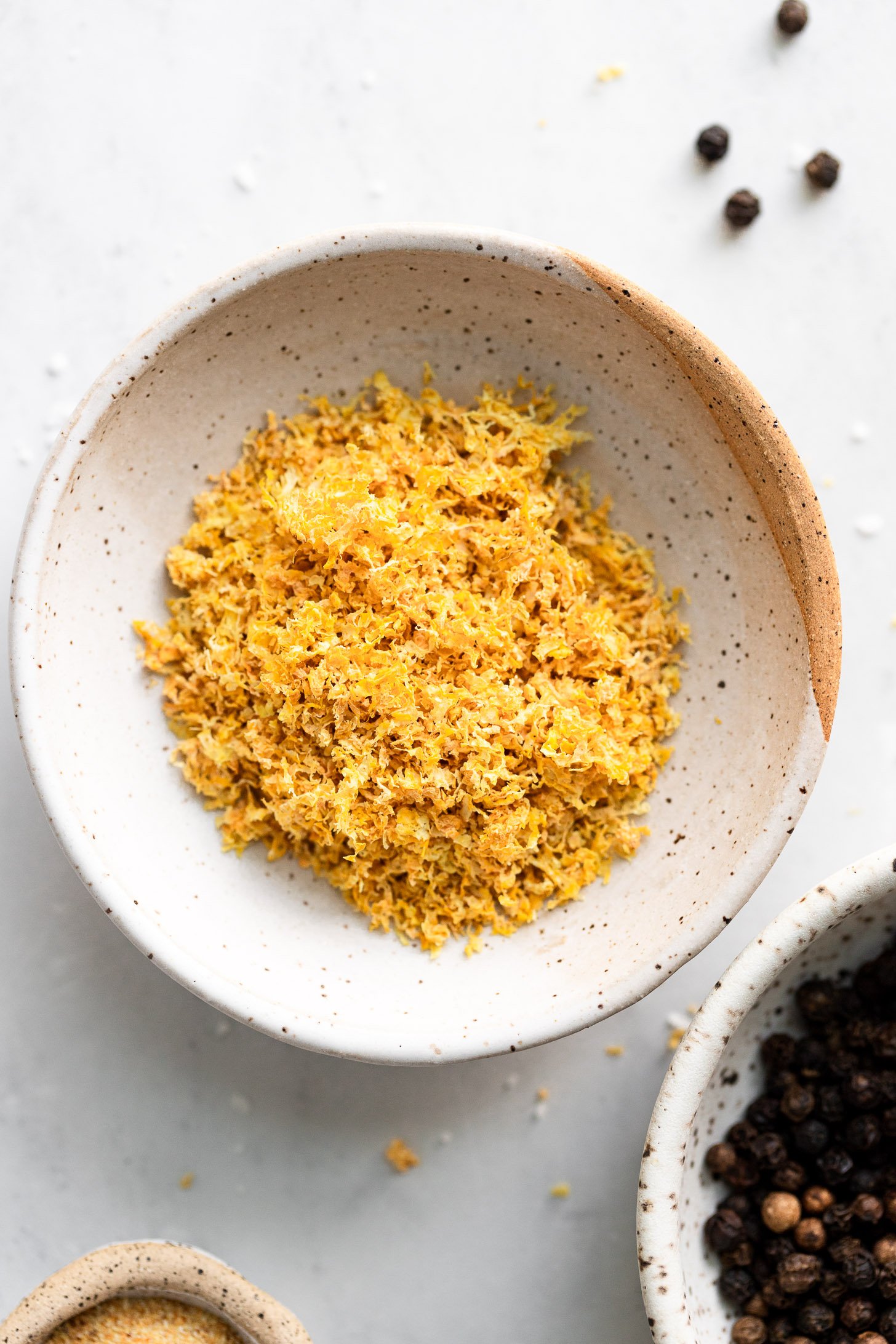
How to Dry Lemon Zest
To take the completely homemade route for this recipe, you will need to dry out your own lemon peel. I’ve tested this both in the oven and air fryer for your convenience. I also use zest instead of the peel so that it dries out faster.
If you have upwards of several hours, you can use the peel for an even more intense lemon flavor. However, I find the zest is just enough around here.
Zest the Lemons
In either dehydration method, you’ll first need to zest the lemons. Because we’re using the peel in such a concentrated method, I highly recommend organic lemons. Be sure to wash them off before zesting, too.
Use a microplane or another fine grater to zest the lemons completely. Be sure to save the whole lemons to use later on – the perfect opportunity to make homemade lemonade!
Don’t press too hard though, or you’ll scrape a lot of the white pith which can be bitter.
Oven Method
To dry lemon zest in the oven, first line a small baking sheet with parchment paper, then spread the lemon zest in as even of a layer as possible (it likes to stick together). Since the lemon zest doesn’t amount to much fresh, and shrinks down even more after it dries, you don’t need a large pan.
Preheat the oven to 150°F and place the baking sheet inside on the middle rack. Bake for about 35 to 40 minutes, tossing halfway through, until the zest is dry. Then, it’s ready!
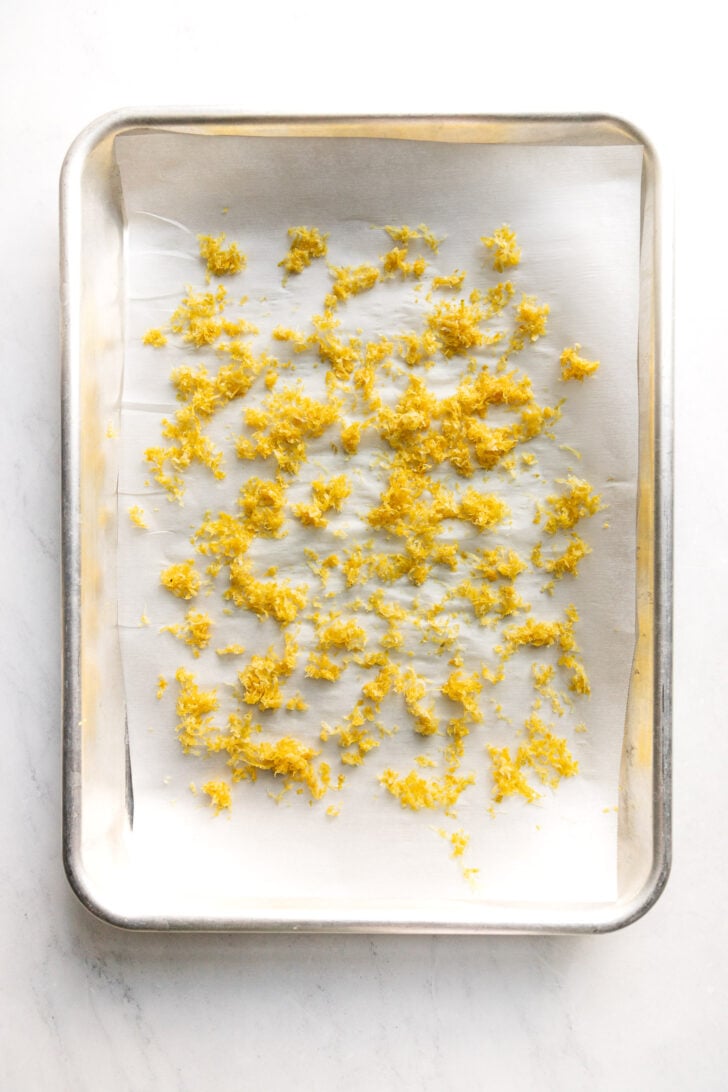
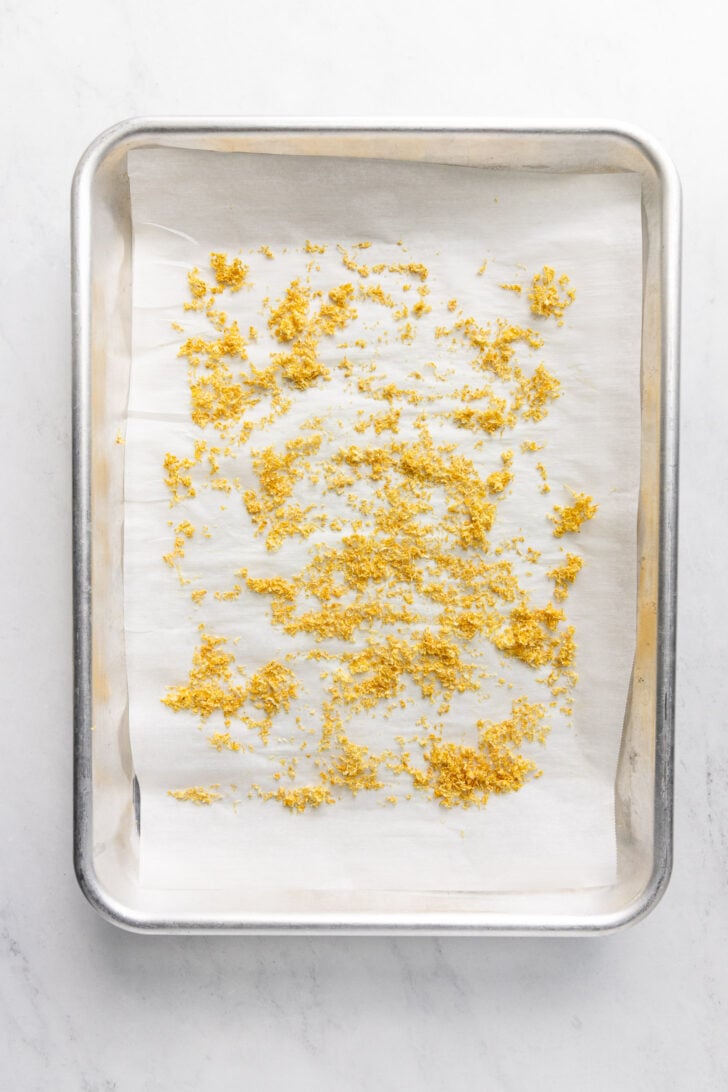
Air Fryer Method
You can even dehydrate it in the air fryer – and you don’t need to use the dehydrator setting either. With my model of air fryer, I found that setting defaults to run for six hours, but we don’t need that!
I do recommend wrapping the crisper plate with parchment paper before adding the zest though, as it will give it somewhat of a solid shelf to lay on. You could place it on the bottom, but I like this method to ensure it doesn’t burn.
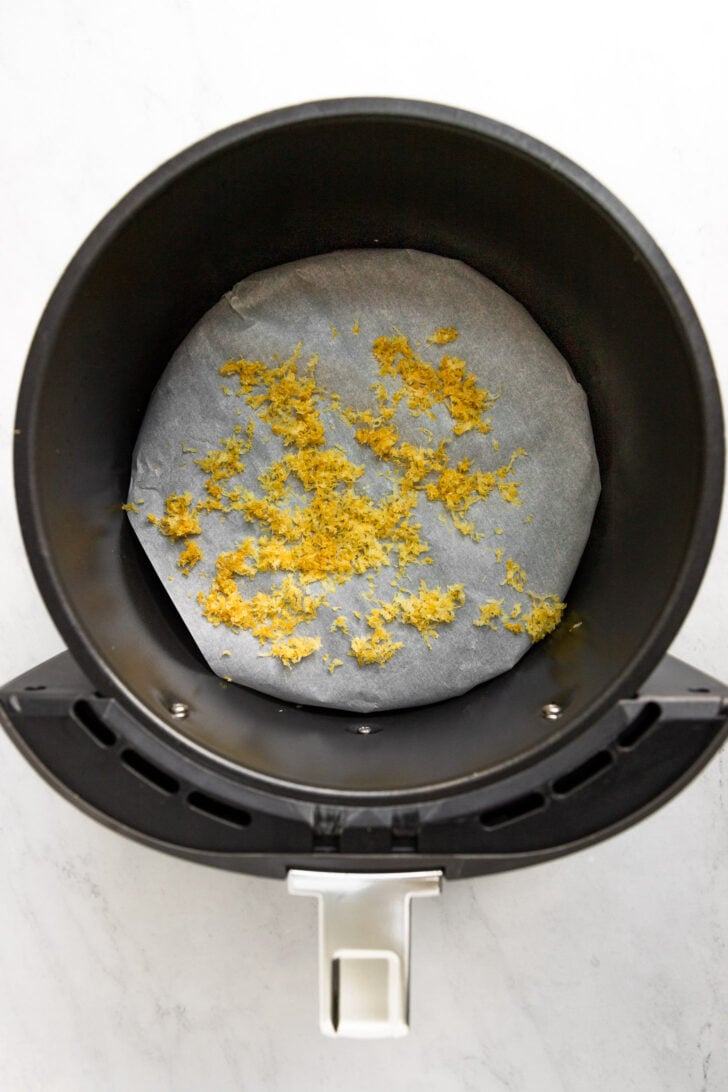
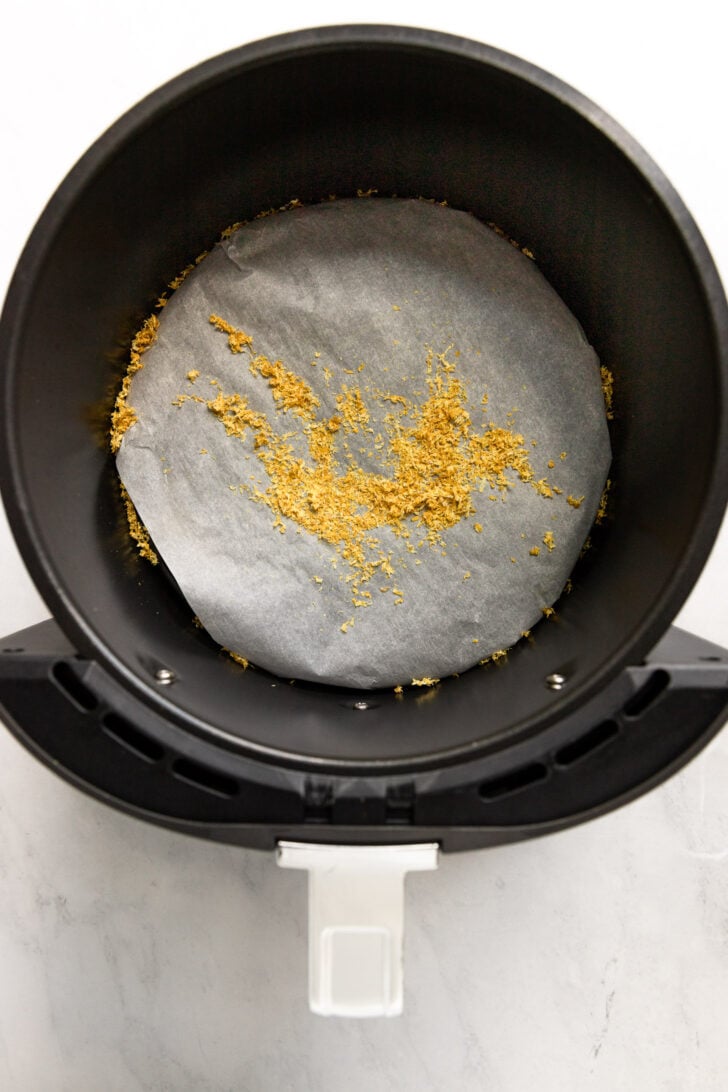
Do note, the zest will move around across the parchment, and some will end up off of it. This is totally fine and you’ll still be able to use it.
Set the air fryer to 150°F as well and in about 30 minutes, the zest should be completely dried out. I have tested this recipe using my 4-quart Ninja air fryer, and the time it takes may vary depending on your model of air fryer.
Grind the Seasoning
As I mentioned earlier, grinding whole peppercorns will result in the freshest flavor with a bold kick, which is why I highly recommend using a spice grinder to make this recipe.
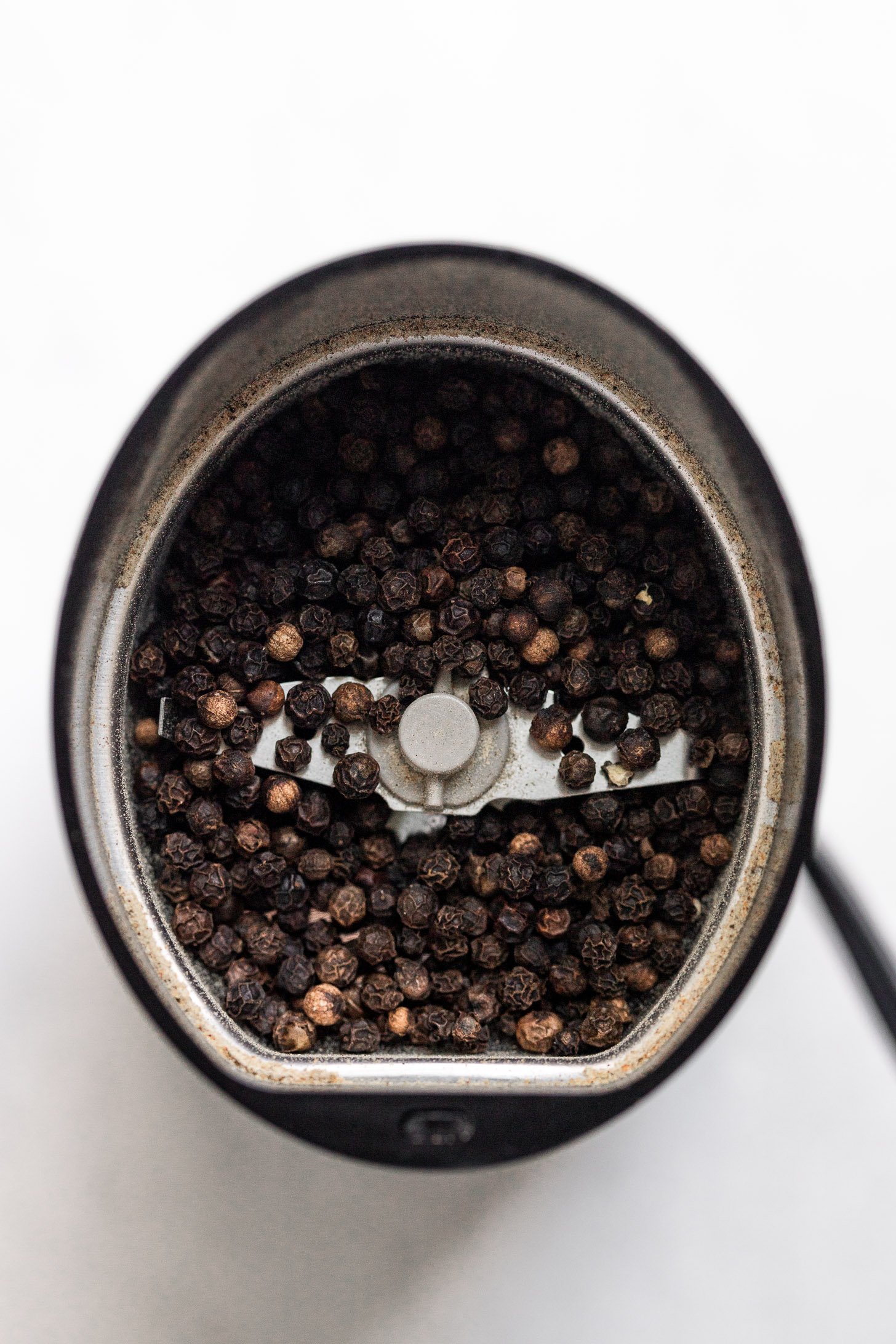
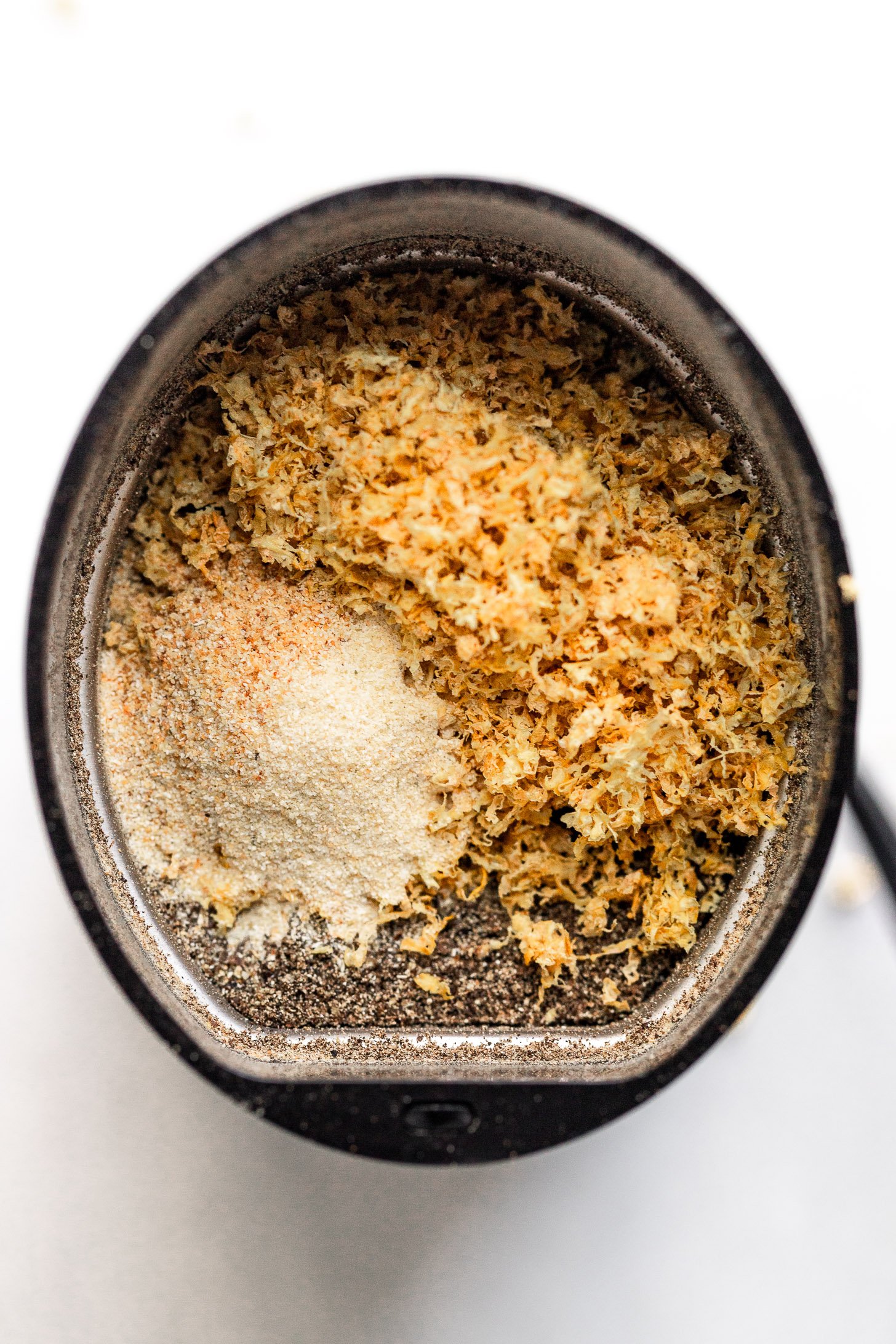
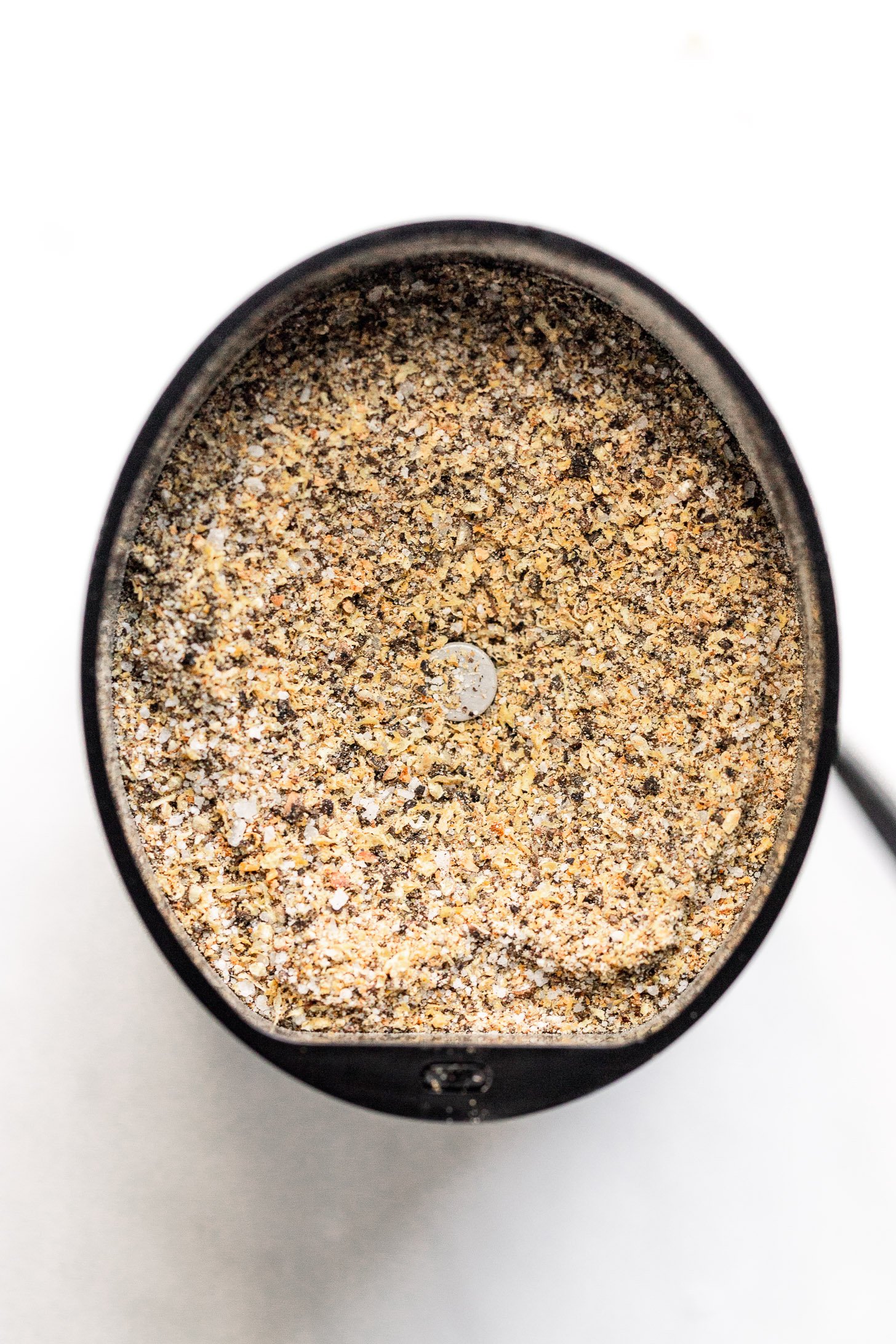
If you don’t have one, you can use already ground black pepper, too, or use your pepper mill to grind it.
Since the peppercorns are so large, grind them first until medium-coarse in texture. Add the garlic and onion powder, lemon zest, and salt. Grind again until fine and uniform.
If you are using homemade dried lemon, you may want to add it to the grinder at the *very* end so it doesn’t get pulverized and lose flavor. Store-bought is thicker and can withstand the extra grind.
Ways to Use Lemon Pepper
Lemon pepper seasoning is like the spicy version of seasoned salt (if you catch my drift). I mean, it’s endlessly versatile, and as long as the recipe can handle a peppery kick with a lemony zest, then it’s perfect. And lucky for us, there are so many recipes that will benefit from it!
- Seasoning Proteins: whether you’re a meat eater and love grilled meats, fish, or shrimp (any seafood really), or a vegetarian that enjoys grilling halloumi or tofu, add this seasoning for a citrusy brightness! Use it in a marinade, too.
- Salad Dressing: lemon and pepper are key ingredients in salad dressings, so why not add some lemon pepper seasoning? Try it in our white balsamic dressing or our Mediterranean vinaigrette!
- Roasted Vegetables: similar to dressings, there are endless veggies that pair well with lemon and pepper. Toss with the seasoning before roasting and let the flavors work their magic. It will shine with asparagus, my absolute favorite roasted broccolini, easy-to-make air fryer frozen okra, and even crispy potatoes!
- Pasta Dishes: a pasta that has black pepper and that works with lemon, this is your answer! Use it with salmon lemon butter pasta or as a flavor boost in this rich and creamy broccoli parmesan orzo.
- Compound Butter: forget chive butter (not really, but expand!), try lemon pepper butter and spread it on fresh bread, corn on the cob, or…
- Popcorn! As if my favorite snack of all time couldn’t get any better. Use it as a seasoning on a batch of fresh popcorn, or take it a step further and use it in this bright lemon parsley popcorn.
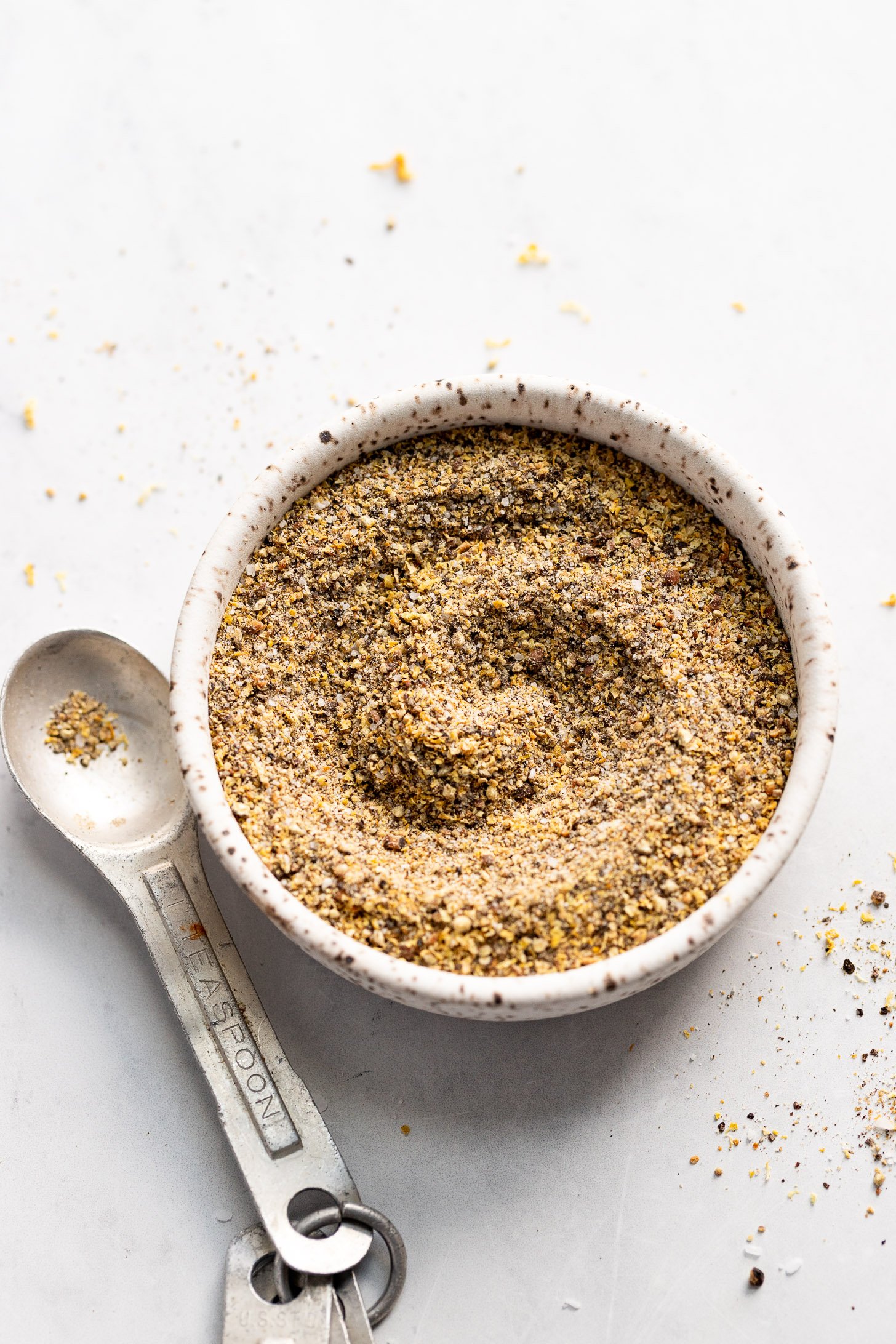
Storage Tips
Store homemade lemon pepper seasoning as you would any other spices or spice mixes, in an airtight container (jars work great!) in a cool, dark place. A cupboard or pantry away from the heat of your oven is a great choice!
How long will it last? Spice blends will last for several months, usually up to 6 months, if stored properly. I like to go no longer than 3 months with this spice blend if using freshly dried lemon zest. Keep in mind that dried herbs and spices will lose their intensity over time, so it’s best to use it sooner rather than later.
Did you make this recipe? Please leave a star rating and review in the form below. I appreciate your feedback, and it helps others, too!
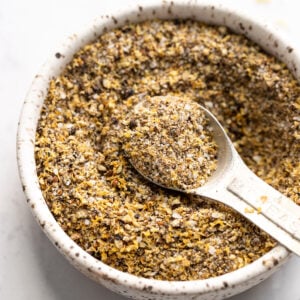
Get the Recipe Versatile Lemon Pepper Seasoning (Quick or Homemade)
Ingredients
- ½ cup organic lemon zest, approximately 6 large lemons
- 2 Tablespoons black peppercorns
- 1 Tablespoon kosher salt
- ½ teaspoon garlic powder
- ½ teaspoon onion powder
- 3 Tablespoons dried lemon peel, for quick method
Equipment
- Air Fryer option
- Quarter Sheet Pan option
Instructions
Dehydrating Lemons (Optional)
- If dehydrating the lemon zest yourself, zest approximately 6 large lemons completely until you have 1/2 cup of zest. Dehydrate it either using the oven or air fryer methods:½ cup organic lemon zest
- Oven: Line a quarter sheet pan with parchment paper and preheat the oven to 150°F. Spread the lemon zest in an even layer across the pan as much as possible (it will like to stick together). Bake for around 35 minutes, tossing a couple of times during the process, until the zest is completely dried out.
- Air Fryer: Line the crisper shelf of the air fryer with parchment paper. Spread the lemon zest on top (it will blow around). Set the air fryer to 150°F and dehydrate for around 30 minutes, tossing a couple of times during the process, until the zest is completely dried out.
Seasoning Blend
- Whether you're using homemade dried lemon or storebought, we're going to continue making the seasoning almost the same way.
- Add the peppercorns to your spice grinder and grind until the consistency of kosher salt (or smaller) forms. Add the kosher salt, garlic powder, and onion powder. If using store-bought dried lemon peel, add it now too. Pulse several times until uniform in consistency; this helps make sure the granules of the larger spices are blended evenly. If using homemade zest, add it very last so it doesn't become lost in the mix, pulsing it just once or twice to incorporate.2 Tablespoons black peppercorns, 1 Tablespoon kosher salt, ½ teaspoon garlic powder, ½ teaspoon onion powder, 3 Tablespoons dried lemon peel
- Store the seasoning blend in an airtight container in a dark, cool cupboard for up to 3 months; it will lose its flavor over time so it's better to use it sooner rather than later. Enjoy!
Notes
- Yields approximately 1/4 cup of seasoning.

